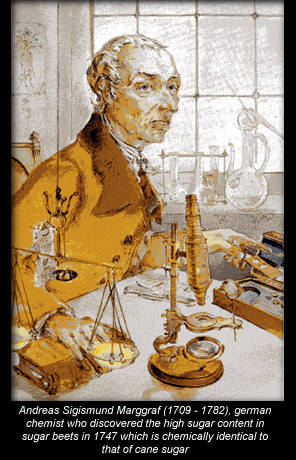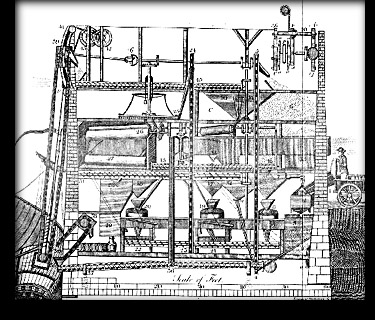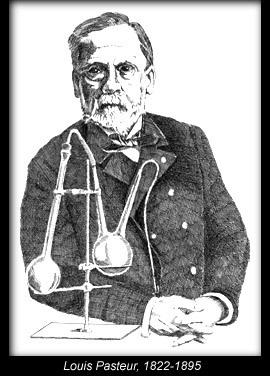
 The industrial revolution brought us the age of technology. This manifested itself in many ways, but essentially there were first great breakthroughs in science, which were followed up by directly and indirectly by newly invented machinery that would produce in mass whatever was discovered. The ever-ingenious entrepreneur of the time (industrialist) was sure to apply this to a profitable enterprise. The motto since, has been and still is "the bigger the better", as is evident by modern globalization. The industrial revolution brought us the age of technology. This manifested itself in many ways, but essentially there were first great breakthroughs in science, which were followed up by directly and indirectly by newly invented machinery that would produce in mass whatever was discovered. The ever-ingenious entrepreneur of the time (industrialist) was sure to apply this to a profitable enterprise. The motto since, has been and still is "the bigger the better", as is evident by modern globalization.

Exploitation of children or slavery was acceptable means in the early stages, and we are all glad that we have come to our senses in that respect. But the legacy of those times lives on: the information highway can provide us with the necessary knowledge to regurgitate all the things that since then have happened. By analyzing the long term effects that some of these applied technologies have had for the betterment or convenience for our forefathers/mothers and possibly for present and future generations, may they be health-wise or better living conditions, we might come to new conclusions. Many of the industrial titans that were born from that time period are still ruling many modern markets, and their ideology hasn't changed much.

 We have to understand that inventions are usually made as they become necessary, in most cases. Four key inventions were made that within a short time period of each other, changed one of our staple diets forever. It is amazing how quickly we seem to have adapted to this new diet, even though few of us alive remember any other way, but it isn't all that long ago. The inventions were so enthusiastically embraced at the time, that the long term health effects weren't considered, because the immediate results were that less people would starve or die of hunger, which at that time was a common death. Overindulgence in some of these new foods is having disastrous consequences on our health and well-being. We have to understand that inventions are usually made as they become necessary, in most cases. Four key inventions were made that within a short time period of each other, changed one of our staple diets forever. It is amazing how quickly we seem to have adapted to this new diet, even though few of us alive remember any other way, but it isn't all that long ago. The inventions were so enthusiastically embraced at the time, that the long term health effects weren't considered, because the immediate results were that less people would starve or die of hunger, which at that time was a common death. Overindulgence in some of these new foods is having disastrous consequences on our health and well-being.

These four inventions or mass produced commodities, are sugar, yeast, white flour, and fats (shortenings derived from oils, hydrogenation process). Some of these raw ingredients have been around since ancient times, but only in very limited quantities. What the Industrial Revolution accomplished is that these became available in massive quantities for the general public's consumption; the newly invented machinery needed a practical application.

The production of sugar from sugar cane began in earnest in the 1600's. England, with many of its colonies in temperate climates like India and then Australia, where sugar cane grew well, had a monopoly on this raw product, which naturally conquered European taste buds. In the early days sugar was worth its weight in gold and England grew quite rich from this new enterprise. European nations wanted to break this stranglehold and the French as well as the German head of states encouraged and even put up price money for anyone that could make sugar out of plants that could be grown in cooler, European climates.
 In 1747 the chemist Andreas Sigismund Marggraf made the discovery that identical sugar could be refined from the sugar beet, which grew well in Europe. But it took another 50 years until the first sugar beet refinery eventually started to produce European made sugar, and large-scale production quickly followed. Through selective breeding of the sugar beet, the sugar contented also increased dramatically, and subsequently the yield of purely refined sugar per beet increased, making it a worthwhile enterprise. In 1802 the first sugar beet refinery was built in Germany and by the mid 1850's, sugar prices became reasonable enough for the general public to indulge in this new luxury food. In 1747 the chemist Andreas Sigismund Marggraf made the discovery that identical sugar could be refined from the sugar beet, which grew well in Europe. But it took another 50 years until the first sugar beet refinery eventually started to produce European made sugar, and large-scale production quickly followed. Through selective breeding of the sugar beet, the sugar contented also increased dramatically, and subsequently the yield of purely refined sugar per beet increased, making it a worthwhile enterprise. In 1802 the first sugar beet refinery was built in Germany and by the mid 1850's, sugar prices became reasonable enough for the general public to indulge in this new luxury food.

With the invention of the microscope the world of microorganisms was discovered. The man most credited and famous for that time, was Louis Pasteur. The yeast cell provided the microbiologist with a convenient specimen and simple cells that was easily studied with the new invention of the microscope. In no time, this led the industrial entrepreneur to isolate vigorous yeast strains, and to produce these in massive quantities: the birth of today's baker's yeast. This enormously simplified the production of wheat-based breads, especially in countries that largely depended, and preferred wheat bread. Formerly traditional sourdough techniques that were used to leaven the bread were replaced by this new baking technology.

White flour has been enjoyed by the elite upper class for a long time, and dates back to Roman and Egyptian times. The Romans even forbade the general public to eat or produce white bread; it was reserved for the sovereign rulers and the powerful. Through repeatedly sifting the flour the so-called impurities were taken out and the flour was ground into a very white and fine powder. The fascination of or the indirectly implied stature of one's rank in society, by eating white bread, has carried on to many of our present food preferences.

 The Industrial Revolution, with its monstrous machinery provided an economic way to produce and grind this type of flour in great quantity. The days of the stone mills became numbered, and the sight of wind or water powered mills became more and more a rarity. Derelict flour mills can still be viewed throughout Europe and North America, but the invention of the roller mills at the end of the 1800's ensured that there was no looking back. The Industrial Revolution, with its monstrous machinery provided an economic way to produce and grind this type of flour in great quantity. The days of the stone mills became numbered, and the sight of wind or water powered mills became more and more a rarity. Derelict flour mills can still be viewed throughout Europe and North America, but the invention of the roller mills at the end of the 1800's ensured that there was no looking back.

A key figure was Oliver Evans (1755-1819), who in America invented, as well as wrote a book called, "The Young Mill-wright and Miller's Guide", which permanently sealed the fate of stone mills. It became a symbol of prosperity in the New World, to eat white bread on a daily basis, and largely contributed to its dominance on the bread market, even today.

The only other ingredient that was needed was fats in inexpensive quantity. Napoleon the 3rd, Emperor of France, put up a prize in the mid 1850's for anyone that  would come up with a product that was healthy, cheap, keeps long, and was wholesome. This prize it was called "Prix Napol1éon". A Professor of agriculture, Mège-Mouriès won it by combining different animal fats with milk. This made an emulsion, and by further adding gland extracts, and using diverse machinery to extract excess water, and then kneading it, it was called "artificial butter" (later to be named Margarine). Initially origin of the fats was from animals, but that changed rapidly. The process for converting vegetable oils into fat was called hydrogenation, and was invented soon after. Most of the oil-producing plants grew again in temperate climates, and were produced mainly through slavery in colonized countries. In 1871 the first Margarine factory opened in Holland, by Paul Jurgens and more followed in rapid succession, because of its profitability. The industrialist, ever eager to supply the needed massive machinery to produce this new commodity, was glad to provide it. It was cheap, affordable, and combined with the other inventions (listed above) opened up a whole new category of baked goods, which could be produced inexpensively in large quantities. would come up with a product that was healthy, cheap, keeps long, and was wholesome. This prize it was called "Prix Napol1éon". A Professor of agriculture, Mège-Mouriès won it by combining different animal fats with milk. This made an emulsion, and by further adding gland extracts, and using diverse machinery to extract excess water, and then kneading it, it was called "artificial butter" (later to be named Margarine). Initially origin of the fats was from animals, but that changed rapidly. The process for converting vegetable oils into fat was called hydrogenation, and was invented soon after. Most of the oil-producing plants grew again in temperate climates, and were produced mainly through slavery in colonized countries. In 1871 the first Margarine factory opened in Holland, by Paul Jurgens and more followed in rapid succession, because of its profitability. The industrialist, ever eager to supply the needed massive machinery to produce this new commodity, was glad to provide it. It was cheap, affordable, and combined with the other inventions (listed above) opened up a whole new category of baked goods, which could be produced inexpensively in large quantities.

The bakers quickly responded with all kinds of newly invented products that incorporated these ingredients. Many modern pastry and bread items have their origins in this creative time period, which lasted from the turn of the 19th Century until even today.

 Our natural attraction to sugar was easily preyed upon, and exploited by candy makers and confectionaries. The two world wars kept the industrialists busy with making war machinery but as soon as the Second World War was over, mega bakeries emerged. Milling and baking processes were even more refined and new generations of 'wonder breads' were born, making enormous quantities of bread and shipping it sometimes even nation wide became possible. Our natural attraction to sugar was easily preyed upon, and exploited by candy makers and confectionaries. The two world wars kept the industrialists busy with making war machinery but as soon as the Second World War was over, mega bakeries emerged. Milling and baking processes were even more refined and new generations of 'wonder breads' were born, making enormous quantities of bread and shipping it sometimes even nation wide became possible.

 This little review shows that in a very brief time period, many of our accepted daily foods were invented rather recently, and did not constitute at all a part of our diet in previous times. It is time to reevaluate some of these practices and the effects that they have had on our health and well-being, and decide if we want to continue on this path. There are many modern day diseases that are plaguing our civilization, which are derived from inappropriate diets. This little review shows that in a very brief time period, many of our accepted daily foods were invented rather recently, and did not constitute at all a part of our diet in previous times. It is time to reevaluate some of these practices and the effects that they have had on our health and well-being, and decide if we want to continue on this path. There are many modern day diseases that are plaguing our civilization, which are derived from inappropriate diets.

I don't think we need to go back to the dark ages to correct this, but by intelligently adjusting or using our newly invented technologies, we can eat a much more traditional and healthier diet to ensure our longevity and well-being. This will let us enjoy life and modern conveniences to a greater extent. We can and should learn from our past mistakes. It is mostly by overindulging in these new products, which cause problems. Education and practicing restraint is mandatory.

In the end the challenge is up to each individual person, but if you have kids, your responsibility is even greater. Food preferences are formed and taught in the early stages of childhood, and the importance of teaching proper eating habits to your kids is essential for the next generation. Sometimes it seems frugal, but you'll be amazed at how influential a child's upbringing can be, once the initial onslaught of teenagerism is over with. I can readily speak of my own experiences with my kids, and can tell you that it has been worth it. J
|
